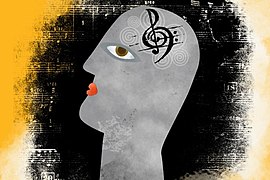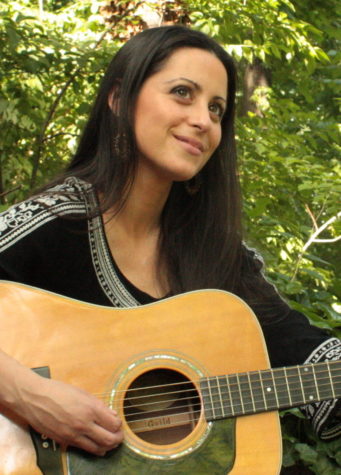Music Therapy: Harnessing the Healing Powers of Music
With the ability to alleviate patients in such critical conditions, music is a strong form of hidden medicine.

Dafna Israel-Kotok, music therapist, singer, songwriter, and founder of Shir Fun, said, “I learned that music therapy is a degree that involves not only the study of music, but how it relates physically, mentally, psychologically and emotionally to people in many different populations and how you could use music as a tool to help so many people.” (Photo Credit: Wuhuiru55, CC BY-SA 4.0
Music saves lives.
It might be hard to believe, but music has a healing power that even some medicines do not possess. Having trouble reducing pain? Listen to some music. Need to jog someone’s memory? Play them their favorite song. Even want to treat Alzheimer’s? Consider music therapy. Music might just be the answer to all of your medical problems.
Music therapy has been proven to be an effective remedy for various health concerns, both physical and mental. Music can improve the health of those with cardiac conditions, low blood pressure, and Alzheimer’s, as well as help those suffering from depression and anxiety.
In most cases, listening to a playlist you curated on your own will not alleviate your medical concerns. Thankfully, music therapists are knowledgeable on how to help one’s ill state and are willing to assist you or a loved one. Before working in their field, music therapists not only need a deep knowledge of music, but they also learn about how the human mind functions, allowing them to accurately understand what they can do to aid their patient.
One person with experience in the music therapy field is Dafna Israel-Kotok. As a singer, songwriter, and the founder of Shir Fun (an interactive Hebrew music program for kids), Israel-Kotok has been surrounded by music from a young age, but was ultimately inspired to pursue music therapy
“I have been drawn to music from a very young age, and I learned to play the guitar by ear. A little after graduating high school, I happened to see a T.V. show of a group of autistic children who performed music together as a band through a music therapy program they attended. These children, who were otherwise not able to communicate at all with other people, could suddenly engage in very complex and meaningful collaborations with others through music. I was so moved by what I saw that I immediately started researching music therapy as a career option,” she said.
Israel-Kotok is located in the New York metropolitan area, and has worked with a vast array of patients, differing in ages, health concerns, and overall background. As the saying goes, “music is a universal language,” and this idea is certainly translated to music therapy. A music therapist can treat someone regardless of their mother tongue or age.
The way a music therapist approaches a session must be unique to the patient to work properly. “If I am working with an infant in the NICU who has a heartbeat that is dangerously high, I would match the music I am playing to the heart monitor and very slowly would bring down the tempo until it is at the rate the doctors would like it to be,” said Israel-Kotok.

Israel-Kotok’s logic doesn’t just come out of thin air – the effects of music on the heart are scientifically proven. A study done by scientists at Chengalpattu Medical College suggests that the rhythm of music is directly correlated with pulse rate and blood pressure. So for example, if a music therapist needed to treat a patient with an abnormally high pulse rate, they would play them a slower song.
Music does not just affect the heart; music also taps into a part of the brain that medicines cannot. Specifically, for people diagnosed with Alzheimer’s, the success of some music therapists in their treatment are amazingly high. Israel-Kotok shared, “I often work with elderly people who have Alzheimer’s disease and are at the end of their lives. Oftentimes, these people cannot say a comprehensive sentence because their memories have been so affected by their disease. They may not even remember their children’s names or anything from their past…It happens every time I have worked with this population that I can play a song that might trigger a memory and this person who could not remember his wife’s name, can sing along every single word to the song. It’s like seeing them come back to life, and it’s incredibly moving to witness.”
Once again, this treatment is not just a miracle. Alzheimer’s targets the hippocampus, the part of the brain that controls memories. University of Central Florida professor and violinist Ayako Yonetani explained that “music may increase neurogenesis in the hippocampus, allowing production of new neurons and improving memory.”
Though scientists have proven miracle work isn’t at play with music therapy, sometimes, it does seem like magic is present. When asked to share a music therapy ‘miracle’ story, Israel-Kotok said, “just last week I had a session with a family of adult children who were saying goodbye to their elderly mother. It was her last moments when I came to work with them. She was Jewish, and I played a song I knew was very significant to her. What happened next was a miracle. With her last breaths, she suddenly started to sign along. Nobody in the room could believe what was happening. Her children all held hands around her and joined the song. It was very emotional and beautiful, and I don’t think that moment could have happened without the connection music has to our spirit in a very deep place that we might not understand.”
Though this phenomenon seems unexplainable, the Beth Israel Deaconess Medical Center has more information to offer pertaining to a similar connection between the brain and singing. Researchers at the Harvard-affiliated center concluded that singing is a useful tool for those whose brain is damaged in a way that limits their speaking ability. When speaking, we rely on the left side of our brain to control and structure our sentences. On the other hand, the right side of the brain is what allows us to produce a rhythm and melody when we sing. Someone who has damage in the left side of their brain, possibly due to a stroke or other brain injuries, could regain their speech through singing, and eventually dropping the melody.
One person who took advantage of this loophole was Gabby Giffords. The former United States Representative was shot on January 8th, 2011, leaving her in critical condition. Giffords was diagnosed with aphasia, a loss of speaking ability, due to the damage she suffered in the left side of her brain. Giffords described that “the words are there in my brain. I just can’t get them out. I love to talk.” To combat her disorder, Giffords utilized her undamaged right side of the brain to incorporate melody and rhythm into her everyday speech. Giffords was able to train her brain to the extent that just two years later she was able to testify before a Congressional committee.
Although we do not fully understand something like a woman on her deathbed being able to sing, the research conducted from so many scientists poses various questions. Was singing a way for her to communicate with her family members in the room? Did the song bring back memories? We may never know for sure, but we do know that music stimulated an unexplainable connection with the people in the room that day that no medicine would be capable of achieving.
“I learned that music therapy is a degree that involves not only the study of music, but how it relates physically, mentally, psychologically and emotionally to people in many different populations and how you could use music as a tool to help so many people,” said Dafna Israel-Kotok, music therapist, singer, songwriter, and the founder of Shir Fun.
Aviv Kotok is a Managing Editor and Advisory Editor in the Editor-in-Chief division of ‘The Science Survey.’ She finds that the most appealing part...
